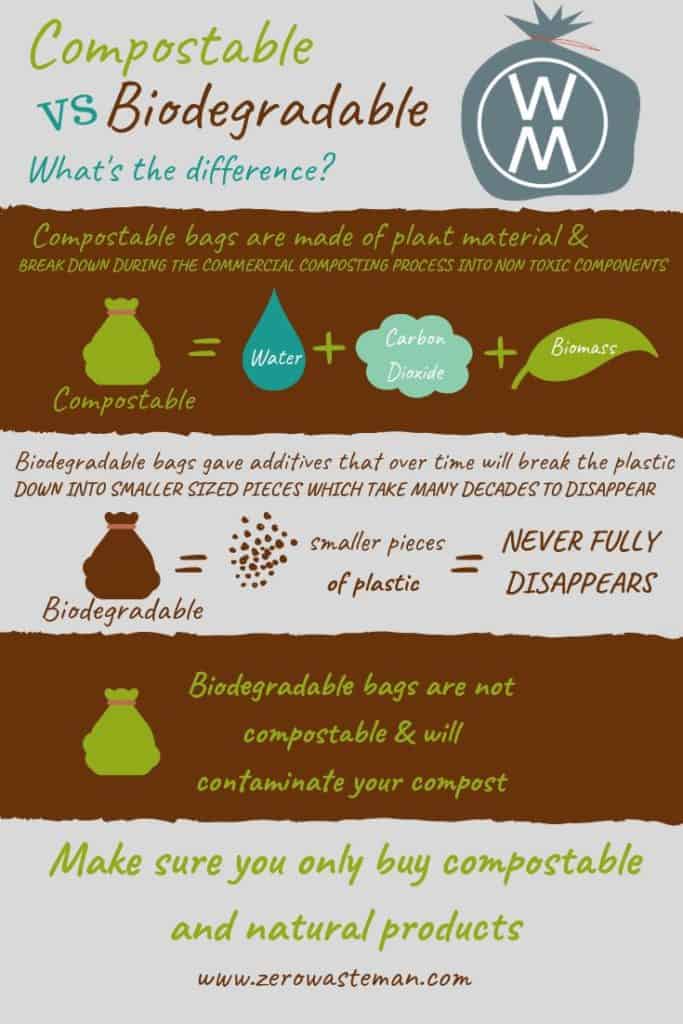Biodegradable VS Compostable. Which one is better? I thought I knew the difference, but turns out I was wrong. Find out for yourself.
When I hear the word bio, my mind has it straight away linked to something positive. It has to be good for the environment when the word bio is in it, right? That’s what the big advertising companies count on as well.

Bio = nature = good, right?
Let’s take a closer look.
What does biodegradable mean?
- Biodegradable means: capable of being decomposed by bacteria or other living organisms.
- Examples of biodegradable materials, also known as “bio-waste” are:
- paper
- wood
- plant products
- food waste
- leaves
- grass clippings
- human and animal poop
I hope you can see the common theme here. All these products are natural. When they brake down with the help of bacteria and fungi, they leave nothing behind but carbon dioxide, water, and biomass within a ‘reasonable‘ amount of time.
Now, ‘reasonable‘ is not really defined, but waaaaay less than 1000 years, which is how long it takes some plastics.
Unfortunately, many materials break down in a more harmful manner, leaving chemicals and/or other toxic substances behind. Also called biodegradable, misleading, right?
Like treated wood to resists bugs, for example.

that blue stuff is treated pine. Supposed to stop bugs and termites from attacking the wood.
Other items such as steel will biodegrade but may take years in the process. Rust will eat away on the steel and eventually make it disappear. Usually, the process of biodegradation goes pretty fast weeks or months rather than years.
Not everything that’s advertised as “biodegradable” actually breaks down.
Are biodegradable plastics a big lie then?
Many “organic” companies use biodegradable packaging, but the items may not be as biodegradable as the consumer thinks.
Major misconceptions surround the difference between compostable and biodegradable packaging and products.
Plastics that are made from corn starch or sugar tend to be called biodegradable. However, they only biodegrade under the right circumstances, which in this case is a mix of bacteria, a high temperature of 140 degrees F for 10 consecutive days, and the right amount of moisture. This is not a cheap process, and there are very few recycling centers in the world that have the setup for this process.
In some countries, it is illegal to state “biodegradable” on plastics. Simply because they usually just break down into smaller pieces.

Related: Are green plastic bags any better?
Take oxo-biodegradable, for example, is it just another fancy way of keeping the big plastic producing companies alive?
Oxo-biodegradable means; added metals and salts to the plastic pallets, which make the plastic break down quicker but still leak harmful toxins into the environment. Sounds like greenwashing to me?!?
So your best and safest bet is to bring your own shopping bag to the grocer and avoid the plastic packaging altogether.
[mailerlite_form form_id=4]What does compostable mean?
Have you heard of a compost heap, or you might even have one in your backyard? Compostable means that a product disintegrates into natural substances without leaving any toxins in the soil behind. Like food waste or leaves and garden clippings.
They will biodegrade into a nutrient-rich waste that continues to benefit the planet. Usually, this process takes around 90 days. It is almost synonymous with “biodegradable,” except it is limited to solid materials and does not refer to liquids.
Conclusion
Just because some items are in pretty green packaging and claim to be biodegradable, doesn’t mean they are suitable for the environment. Next time you go shopping, pay close attention to the label. Now that you have an understanding of what is right and what is not.
In my opinion, companies should be more careful with the terms they use on their packaging because they are often misleading. Tightening the consumer laws might be one way to make it more clear to us. We should know where we put our money.
So many of us want to make a difference by buying “BIO” and “GREEN” products, but if the statements on the packagings are wrong, how can we consume, right?
Do you understand the difference between biodegradable and compostable a bit more now, or are you still confused?
Let us know in the comments below.
